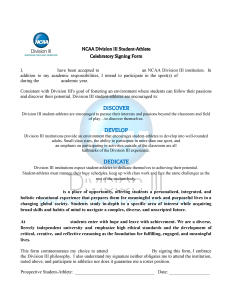Should evolution be taught in schools? (part 1)
unnecessary influence
November 20, 2017

*The following story is an opinion piece of one reporter and does not reflect, nor represent the views of the Crimson Connection staff.*
Evolution has been taught in classrooms since the 1800s, and in states such as Florida, Texas and Kansas, students are required to be educated on the theory of evolution. Evolution should not be taught in public schools because, although it is openly displayed as a theory, evolution continues to impact and bias students’ opinions and outlooks on modern science. Because the state chooses evolution in its curriculum as the source of biological life, it denounces the credibility of other scientific theories, such as intelligent design. For students that do not have their own opinions on the source of life, they look to their peers and their educators.
The theory of evolution is typically portrayed as a logical explanation for the source of all life, yet there are skimmed over holes and leaps in the evidence used in curriculum. For example, there are several fossils, such as the African KP 271 and the Taung Child, that do not fit in with the evolutionary timeline, yet are simply ignored. One of the largest instabilities of the theory can be seen in the constantly changing statistics regarding the timespan of the earth. In the 1980s, Texas education identified the formation of the earth to be hundreds of millions of years old, as of 2016, the date was 4.2 billion.
Until evolution can be declared a scientific fact, it should not be taught in public schools. The possibility of accidentally teaching millions of American students a mistake is realistic. In the early 2000s, scientists changed the estimation of the lifespan of the universe from 13.73 to 13.82 billion years, after making a more detailed discovery. Millions of adults had to reexamine the credibility of their early scientific education.
Although the amount of time that the universe has been around does not directly affect their lives, a belief in the origin of humanity does. If through evolution, a person understands that they are a byproduct of science, he or she may find that they have no purpose but the routine that drives them. The state should not have the power to influence the perspectives of vulnerable students.
Some scientists say that evolution should be taught in classrooms because young people need to know the basics of microbiology. With this knowledge of change in bacteria and viruses, the next generation of scientists would be able to develop treatments of antibiotic resistant bacteria and emerging viruses. But just as not every student is going to be an author or a restaurant owner, not every American in our next generation is going to be a microbiologist. Students should not be forced to learn a theory that may only be costing them their time. Sciences classes should be equipping students with the necessary tools for pursuing and discovering their own conclusions, not driving home their own beliefs.
If microbiologists and educators believe evolution can change the future of science, it could be offered in an optional biology class. In this case, students could choose what ideas influence their education.
Evolution is not a fact. It is a theory, which could be just as untrue as the estimated timespan of the universe was in the late 1990s. Even a theory holding the faith and credibility of millions of certified scientists is still a theory. A theory proven by years and decades of fundamental and enhancing evidence is simply a theory. The public education of an entire generation of Americans should not be implemented by beliefs that could possibly be false. This next generation should be provided with a concrete education of which they can be certain and proud.
Photo by Flickr User: The British Library
Read the other side here: https://www.thecrimsonconnection.com/7138/opinions/should-evolution-be-taught-in-schools-2/




Mark Hable • Feb 16, 2021 at 11:46 AM
‘Theory’ in the context of science doesn’t mean what you think it means. You have internet access. Study up. There is no excuse for this type of gross ignorance in today’s world.
Lena • Jan 28, 2021 at 1:05 PM
I want to say, thank you for saying that evolution is a theory. I personally don’t believe in evolution. I just don’t see the evidence. I see lots of natural selection but that isn’t molecules-to-man evolution. We have no evidence of this. Also, another key argument for evolutionists is that matter can create living matter without an intelligent designer. However, ask any major evolutionist and they can’t give you any examples of this. Personally I believe that there has to be some form of intelligence.
Sam Hope • Dec 10, 2021 at 3:35 PM
Hi, although evolution is simply just a theory, the word theory doesn’t have the context you believe it to have in science, it’s not just a plausible idea, it’s basically an unobservable fact. We can’t see evolution but there’s evidence which is undeniable. For example, sediment layers within the earths crust, showing fossils over time and the types of fossils are almost the same in all parts of the world excluding some anomalies which can be simply described as “different situation”, for example if the animal drowned, and sank down to a different layer which slowly over time got covered up, the water body along with it giving the appearance of a solid ground but we can look at erosion at the rocks around the fossil and come to a reasonable conclusion of the time it actually died. Additionally, there is a great example of evolution at the Galapagos islands, where we can observe birds from the same family which live on different islands (Too difficult to travel back or better resources so they stay) and have over thousands of years, evolved the shape of their beak to be able to match their food source and the requirements needed to gather it. Also, we can prove the earth is definitely old enough for these events to occur as we can find multiple fossils of the exact same species (at the expected layer in sediment might i add) in multiple continents separated by oceans, something only explainable by continental drift, something we can can make reasonable estimates for using current Magma flow speeds and the rate of which the tectonic plates currently move to show that it would take thousands of years, more than the creationist view of 6000 or so, to occur. Continental drift is an undeniable fact as we can observe where the land masses have collided, separated etc over time which shows that it must have occurred way before this 6000 year period. Now I’m not implying Religion and Science can’t exist in limbo with each other, they can, however I do believe it would be wrong to say that we are an element of Intelligent design, as, with most Christians I have met, I have been told of how God would want to connect with us which I’d find strange as if we’re an element of Intelligent design then why do we have proof of evolution which directly contradicts such a proposal? As for Lifes creation, we can describe this through Abiogenesis, something that I’m not too familiar with but if i remember correctly, has something to do with proteins, inanimate chemicals coming together to form DNA structure, I’ve obviously missed a few steps but someone like “Professor Dave Exsplains” on YouTube, a Biochemist who’s debated the topic of Creationism vs Evolutionism multiple times, would be a good source and I highly recommend watching his videos and debates on the subject as they are highly informative. Now the Bible, while yes, the Centre point for an entire religion, evidence for a theory can not be all be cited as “the Bible says so” as this isn’t a valid argument. While I’m in no way attacking Christianity in any way here, I would like to bring attention to the fact that many events cited in the bible are almost impossible, such as the building of an ark, which was built by an unskilled craftsman but thousands of years later, in 1909 I believe or somewhere around then, when the most skilled craftsman in the world tried building a ship about 2/3s of the size, it was ripped apart relatively easily and most of the crew sadly perished, despite the arks survival in powerful winds and waves. If you are of another faith then I’m in no way educated enough to know much about the beliefs of an intelligent designer in other religions but I’m going to stick with my assumption of you being Christian, if you aren’t then feel free to inform me of your faith so I can do some research into it and see if there’s any evidence for and against. Now back on to the bible, as previously shown, it is not in anyway a viable source for that reason and for Creationism to be considered at all credible, will require some physical evidence or a clear show of working, method and credible explanation, following the Scientific Method. The Toxicity some members of the Creationist view is, in my opinion a bad representation of their community and I don’t believe it’s fair to have people who just cite the Bible as a source as trustworthy and viable as there are better methods we can use to prove our respective theories. Furthermore we can show that the Universe itself was created before the Bible claims, another indicator of its unreliability. The Bible claims the universe itself to be, as previously mentioned, 6000 years old (or so I belive as i haven’t personally read the bible however I’m aware it claims the universe to be much younger than is known) which, by looking at the expansion of the Universe, background radiation and believe it or not, the size of Black Holes, we can determine to be false. Using black holes alone as it’s the one I’m most familiar with, the size and relative mass of some Ultramassive Black Holes (a real class of black holes, not a made up unit) is only achievable in a Universe with a lifespan that matches that of ours, roughly 5 Billion Years or so, as it would take Billions of years to absorb enough mass to reach such a monstrous scale, alone proving the age of the universe. Finally, animal mutation, something that most creationists claim contradicts evolution as why would an animal not mutate in a specific way to match its needs, something which is simply explained as the mutation being random and natural selection then slowly making that mutation more common as animals with it survive longer and animals without it usually die without producing an offspring. These mutations cannot be chosen and are that of luck. In conclusion, I find it quite clear that there is no argument between Creationism vs Evolutionism as I find the Proof for evolution outstanding and the flaws of a creationism model to be a good indicator of a fatally flawed theory that requires more evidence to ever be received as viable i the scientific community. If you’d like to debate any of my points feel free as I quite enjoy discussing the topic (respectfully of course) and wouldn’t mind doing a small debate but with the evidence I’ve shown here, I’d make the claim that there is no real way for the Creationist model to coexist with current observations within the real world such as my points on Fossils and Black Holes, providing a clear proof that the Bible is an unreliable source and that Creationism as a whole does not exsplain what we see in the real world.